The Muse Switches Gears
After 82 consecutive days of adding to the draft of Book #4 I broke my fiction streak on Friday -- to write two prize-winning poems on two hours sleep....
On Friday and Saturday I attended the annual convention of the Florida State Poets Association. The Sunshine Poets chapter here in Citrus County hosted the meeting, which drew poets from across the state. Last October I'd driven to Daytona Beach on the Atlantic coast. This year I drove about 4-1/2 miles from home -- all the more convenient because Saturday was also the last session of the course I teach at the art center.
Various other projects left me with a severe sleep deficit coming into Friday. The convention's opening presentation, "Poetry Through Nature," was a marvelous slide show of images taken by members of the local butterfly club (an affiliate of the North American Butterfly Association). We then had a few minutes to write a quick piece on butterflies for a contest of poetry written extemporaneously. I suspect my own photography and ensuing research helped me on this.
The second poem was for a contest announced a few weeks ago (accompanying the convention reservation form), but since I've been concentrating on fiction I dashed off a poem between the time I got home after 11PM Friday and the time I went to bed around 1AM Saturday. Length limit was 12-20 lines. I did what I call a parallel blank verse (I don't know if anyone else has done that, but what the heck). Blank verse is written in iambic pentameter (the same meter used in a sonnet) but has unrhymed lines. I wrote a 20-line poem in two 10-line sections and rhymed the corresponding lines in each section: 1 with 11, 2 with 12, 3 with 13, etc., all the way to 10 with 20.
Both poems won first place. I took home $10 and two books as prizes, including one that I could choose -- so I snatched a copy of Diane Ackerman's 1998 collection I Praise My Destroyer, because I loved her 1977 The Planets: A Cosmic Pastoral. Not bad for two hours of sleep. :) Normally I enter the state contests, but I didn't this year because I was in full-fledged fiction mode.
I'll try to get the two poems published before I post them, since posting online constitutes publication and most places want previously unpublished material. I was also at the conference to distribute our 24th annual anthology, which I've produced for four years now and edited for two years (and will continue to do so). The poem I have in that book -- also written in iambic pentameter -- had won first prize in the 2004 "Save Our Earth Award" contest of the National Federation of State Poetry Societies. It appears in the NFSPS anthology Encore for that year and now in Anthology 24:
First Things First
When water's worth surpasses that of gold
and breathing freely brings the keenest joy,
and all the waste that we have bought and sold
no longer find a place in our employ –
when we have learned that war is over land
and all that nature yields to let us live,
be it savannah, mountainside, or sand –
when we have learned that something's got to give
and what we've got to give becomes our fear,
accustomed to the task of wanting more
and wanting new, discarding every year
the very goods that we had craved before –
when we have given up economies
that run neither to logic nor to scale,
and blue chip stocks are worthless next to trees,
and we must be sustainable or fail –
when we become endangered as the beasts
whose DNA we treasure in our vaults
for times when our plundering will cease,
and finger-pointing, faulting upon faults
will come to rest at last upon us all –
when then we take responsibility
and stop, and listen to our bloodbeat call
and slow the progress of sterility –
then we will learn the wisdom of the grass
that knows the wind that carries every song
that tells of how our nature must surpass
the artifice we thought would make us strong --
when even ants are teachers and we take
the time to hear their sermons on the mound,
and we will walk the long way for the sake
of coaxing one more lake to stay around --
then no one needs to walk the path alone
as bound together, we behold our worth
and come at last to our ancestral home
as creatures nurturing this good, green earth.
--------------------------------
I was hoping to get around seven hours of sleep Friday into Saturday, but Daisy had other ideas. At around 5:45 she MEOWMEOWMEOWed me out of a dream and a sound sleep. Since I was now fully awake, I checked e-mail to coordinate with folks at the art center, since I'm also getting a newletter out this weekend and our graphics designer had last-minute changes. I answered another e-mail from a client (whose job I finished and sent off earlier today). I then popped over to the conference and our board meeting, which started at a groaning 8:30 AM -- or, more precisely, when the coffee was ready.
About an hour before I taught my class, my friend Loretta Rogers gave a presentation on critiquing that I thought would be perfect to share with my students. (Loretta is the critique coordinator for the Tampa Area Romance Authors, which is affiliated with Romance Writers of America.) I asked her if I could distribute her handout. She loved the idea, and an hour later my students loved her presentation.
Teaching meant I missed the luncheon, but I had a chance to mingle during the buffet dinner. I also took dozens of photos and have CDs of those ready to send to various folks. I managed to get to bed a little before 2 AM, about 20 hours after Daisy's Saturday serenade.
Fortunately for both of us, she let me sleep this morning.
Before Thursday's free-writing meeting at the art center I said hello to this little gal:
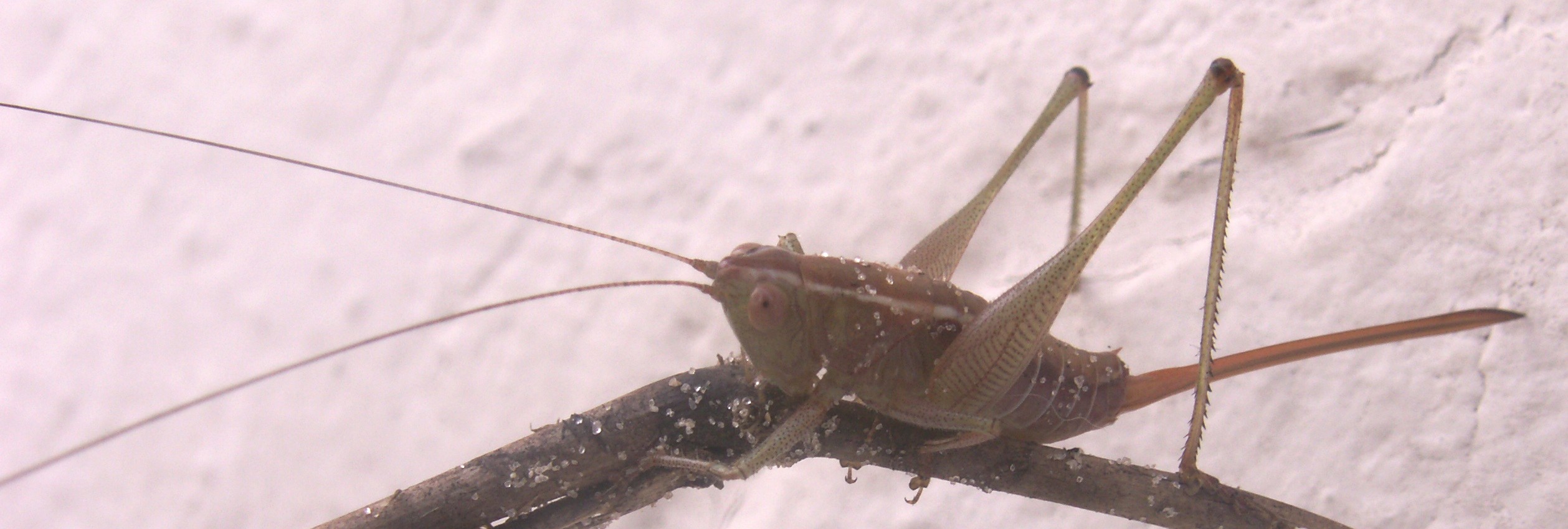
I think she's a Conocephalus (Lesser Meadow Katydid). That tail-like appendage is an ovipositor.
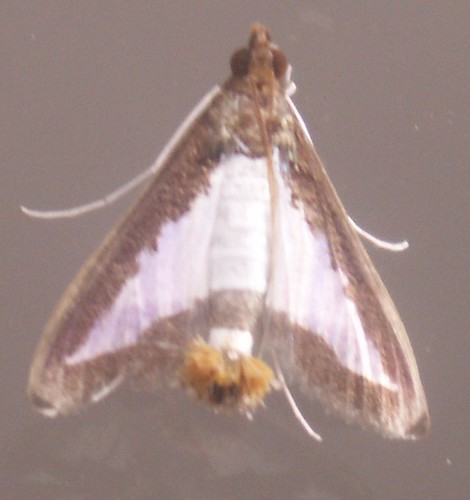
This Melonworm Moth was hanging out on the window of 2 Bakers after the meeting. Diaphania hyalinata, Family Crambidae (Crambid Snout Moths). I waved to Jason, one of the staffers, who by now is used to me climbing on a chair at one of the outside tables to photograph bugs.
According to Bugguide.Net, this moth is common in Florida, where its season lasts all year (though this is the first of its kind that I've seen. Nobody's tried to use it as an eraser; it really does have a rear like that). It's also found in the neotropics, and ranges throughout eastern North America. As the common name implies, larvae feed on cucumbers, melons, and squash.
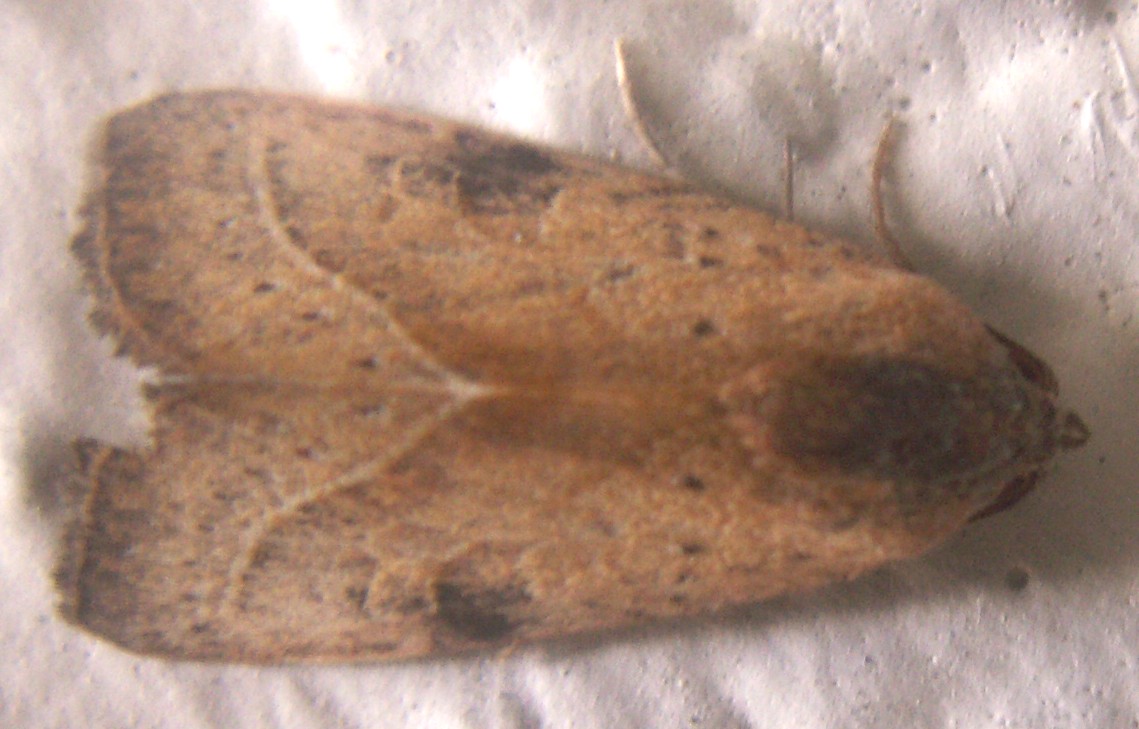
This moth is called The Wedgeling, which piques my interest because its name is not Wedgeling Moth but a definitive The Wedgeling. I don't know why. It was hanging out at the post office around 4:30 PM, right across from the Melonworm. Galgula partita, Family Noctuidae (Owlet moths). According to Bugguide.Net, this moth ranges through "most of North America but missing from Canadian prairie provinces; occurs south to Guatemala and islands of the Caribbean....adults fly from March to November in the south; May to September in the north." The black dotted subterminal line (ST) line indicates this one is a male.
(Figure 2.2 of this article provides a good guide to wing markings and what the abbreviations mean.)
Wood sorrel is the larvae's food of choice. It's also my favorite edible weed. This three-leafed clover grows wild around our house, but I was first introduced to it when I lived in Cambridge, Massachusetts. Wood sorrel is rich in Vitamin C and will give you a great citrus burst of flavor after about a second of chewing. Botanical.com gives more information about the plant.
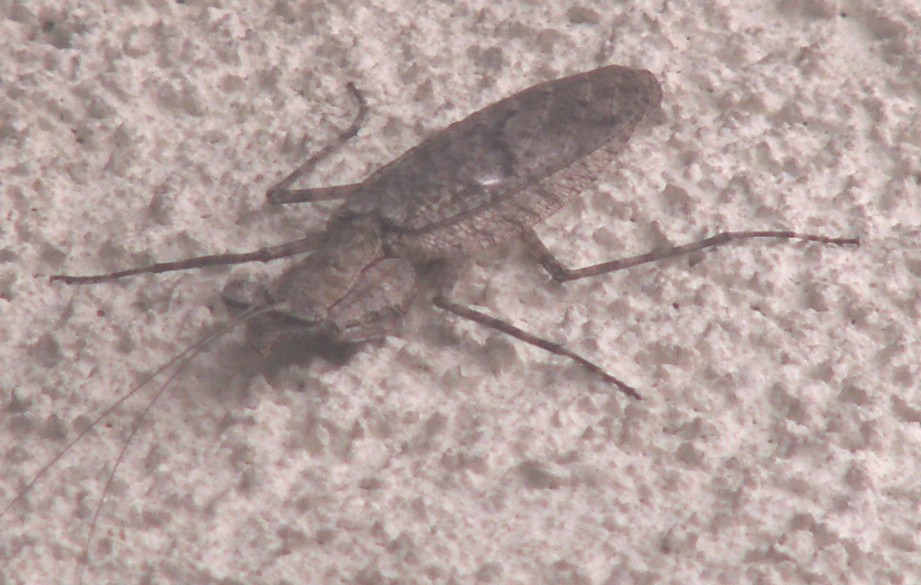
Male Grizzled Mantid, Gonatista grisea, Family Mantidae. Also called the Lichen Mimic Mantid. I saw this one high up on a column shortly after noon on Friday and couldn't for the life of me figure out what it was.
According to Bugguide.Net, this mantid's range includes South Carolina, Georgia, Florida, Puerto Rico, and Cuba. It's a male because its wings cover its entire abdomen and the sides of its abdomen are smooth rather than lobed.
On Friday and Saturday I attended the annual convention of the Florida State Poets Association. The Sunshine Poets chapter here in Citrus County hosted the meeting, which drew poets from across the state. Last October I'd driven to Daytona Beach on the Atlantic coast. This year I drove about 4-1/2 miles from home -- all the more convenient because Saturday was also the last session of the course I teach at the art center.
Various other projects left me with a severe sleep deficit coming into Friday. The convention's opening presentation, "Poetry Through Nature," was a marvelous slide show of images taken by members of the local butterfly club (an affiliate of the North American Butterfly Association). We then had a few minutes to write a quick piece on butterflies for a contest of poetry written extemporaneously. I suspect my own photography and ensuing research helped me on this.
The second poem was for a contest announced a few weeks ago (accompanying the convention reservation form), but since I've been concentrating on fiction I dashed off a poem between the time I got home after 11PM Friday and the time I went to bed around 1AM Saturday. Length limit was 12-20 lines. I did what I call a parallel blank verse (I don't know if anyone else has done that, but what the heck). Blank verse is written in iambic pentameter (the same meter used in a sonnet) but has unrhymed lines. I wrote a 20-line poem in two 10-line sections and rhymed the corresponding lines in each section: 1 with 11, 2 with 12, 3 with 13, etc., all the way to 10 with 20.
Both poems won first place. I took home $10 and two books as prizes, including one that I could choose -- so I snatched a copy of Diane Ackerman's 1998 collection I Praise My Destroyer, because I loved her 1977 The Planets: A Cosmic Pastoral. Not bad for two hours of sleep. :) Normally I enter the state contests, but I didn't this year because I was in full-fledged fiction mode.
I'll try to get the two poems published before I post them, since posting online constitutes publication and most places want previously unpublished material. I was also at the conference to distribute our 24th annual anthology, which I've produced for four years now and edited for two years (and will continue to do so). The poem I have in that book -- also written in iambic pentameter -- had won first prize in the 2004 "Save Our Earth Award" contest of the National Federation of State Poetry Societies. It appears in the NFSPS anthology Encore for that year and now in Anthology 24:
First Things First
When water's worth surpasses that of gold
and breathing freely brings the keenest joy,
and all the waste that we have bought and sold
no longer find a place in our employ –
when we have learned that war is over land
and all that nature yields to let us live,
be it savannah, mountainside, or sand –
when we have learned that something's got to give
and what we've got to give becomes our fear,
accustomed to the task of wanting more
and wanting new, discarding every year
the very goods that we had craved before –
when we have given up economies
that run neither to logic nor to scale,
and blue chip stocks are worthless next to trees,
and we must be sustainable or fail –
when we become endangered as the beasts
whose DNA we treasure in our vaults
for times when our plundering will cease,
and finger-pointing, faulting upon faults
will come to rest at last upon us all –
when then we take responsibility
and stop, and listen to our bloodbeat call
and slow the progress of sterility –
then we will learn the wisdom of the grass
that knows the wind that carries every song
that tells of how our nature must surpass
the artifice we thought would make us strong --
when even ants are teachers and we take
the time to hear their sermons on the mound,
and we will walk the long way for the sake
of coaxing one more lake to stay around --
then no one needs to walk the path alone
as bound together, we behold our worth
and come at last to our ancestral home
as creatures nurturing this good, green earth.
--------------------------------
I was hoping to get around seven hours of sleep Friday into Saturday, but Daisy had other ideas. At around 5:45 she MEOWMEOWMEOWed me out of a dream and a sound sleep. Since I was now fully awake, I checked e-mail to coordinate with folks at the art center, since I'm also getting a newletter out this weekend and our graphics designer had last-minute changes. I answered another e-mail from a client (whose job I finished and sent off earlier today). I then popped over to the conference and our board meeting, which started at a groaning 8:30 AM -- or, more precisely, when the coffee was ready.
About an hour before I taught my class, my friend Loretta Rogers gave a presentation on critiquing that I thought would be perfect to share with my students. (Loretta is the critique coordinator for the Tampa Area Romance Authors, which is affiliated with Romance Writers of America.) I asked her if I could distribute her handout. She loved the idea, and an hour later my students loved her presentation.
Teaching meant I missed the luncheon, but I had a chance to mingle during the buffet dinner. I also took dozens of photos and have CDs of those ready to send to various folks. I managed to get to bed a little before 2 AM, about 20 hours after Daisy's Saturday serenade.
Fortunately for both of us, she let me sleep this morning.
Before Thursday's free-writing meeting at the art center I said hello to this little gal:

I think she's a Conocephalus (Lesser Meadow Katydid). That tail-like appendage is an ovipositor.

This Melonworm Moth was hanging out on the window of 2 Bakers after the meeting. Diaphania hyalinata, Family Crambidae (Crambid Snout Moths). I waved to Jason, one of the staffers, who by now is used to me climbing on a chair at one of the outside tables to photograph bugs.
According to Bugguide.Net, this moth is common in Florida, where its season lasts all year (though this is the first of its kind that I've seen. Nobody's tried to use it as an eraser; it really does have a rear like that). It's also found in the neotropics, and ranges throughout eastern North America. As the common name implies, larvae feed on cucumbers, melons, and squash.

This moth is called The Wedgeling, which piques my interest because its name is not Wedgeling Moth but a definitive The Wedgeling. I don't know why. It was hanging out at the post office around 4:30 PM, right across from the Melonworm. Galgula partita, Family Noctuidae (Owlet moths). According to Bugguide.Net, this moth ranges through "most of North America but missing from Canadian prairie provinces; occurs south to Guatemala and islands of the Caribbean....adults fly from March to November in the south; May to September in the north." The black dotted subterminal line (ST) line indicates this one is a male.
(Figure 2.2 of this article provides a good guide to wing markings and what the abbreviations mean.)
Wood sorrel is the larvae's food of choice. It's also my favorite edible weed. This three-leafed clover grows wild around our house, but I was first introduced to it when I lived in Cambridge, Massachusetts. Wood sorrel is rich in Vitamin C and will give you a great citrus burst of flavor after about a second of chewing. Botanical.com gives more information about the plant.

Male Grizzled Mantid, Gonatista grisea, Family Mantidae. Also called the Lichen Mimic Mantid. I saw this one high up on a column shortly after noon on Friday and couldn't for the life of me figure out what it was.
According to Bugguide.Net, this mantid's range includes South Carolina, Georgia, Florida, Puerto Rico, and Cuba. It's a male because its wings cover its entire abdomen and the sides of its abdomen are smooth rather than lobed.








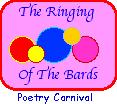


2 Comments:
Congratualions on the prize winning poems! Your life is so full! I love the line "wisdom of the grass."
Congratulations on winning first place in the poetry contests! Proud as heck of you, of course. Your poetry has cadence and depth: "wisdom of the grass," and "sermons on the mound" - beautiful!
Post a Comment
<< Home